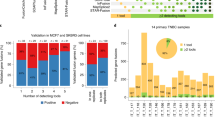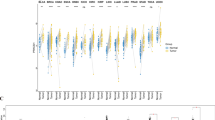Abstract
Purpose: Knowledge about galectin expression by human tumor cells is mainly restricted to galectins-1 and -3. This study was conducted to define the gene expression pattern of all presently known human galectins in tumor cell lines of various histogenetic origin (galectinomics). Methods: The presence of mRNAs for human galectins-1, -2, -3, -4, -7, -8, and -9 was monitored by RT-PCR analyses in a panel of 61 human tumor cell lines of different origin (breast, colon, lung, brain, skin, kidney, urogenital system, hematopoietic system). Results: The validity of the technique was first confirmed by comparison of RT-PCR data with those obtained by Western blotting and cytofluorometry for galectins-1 and -3 in 18 cell lines. The following detection of a complex pattern of gene expression beyond commonly studied galectins-1 and -3 underscored the need for this fingerprinting. The most abundantly expressed message for a member of this lectin family was galectin-8 with 59 positive cell lines. With the exception of the tested lung tumors, galectin-1 and -3 transcripts were frequently expressed in the cell line panel with differences between individual cases. Positivity for galectins-2 and -4 was confined to a significant fraction of colorectal and neural tumors. Signals for galectin-9, the third known human tandem-repeat-type galectin besides -4 and -8, appeared in colorectal carcinoma cell lines with a frequency similar to that of galectin-4 but with inter-line differences. Its expression was restricted to lines of this tumor type, of the tested ovarian carcinoma, and hematopoietic malignancies. Conclusions: The results clearly demonstrate that human tumor cells express more mRNA species for galectins than those for galectins-1 and -3. To derive unequivocal diagnostic and prognostic information by immunohistochemistry on galectins with antagonistic impact on growth control and significant influence on cell adhesion, additional monitoring of these so far insufficiently studied family members is essential.
Similar content being viewed by others
Author information
Authors and Affiliations
Additional information
Received: 27 July 2000 / Accepted: 8 September 2000
Rights and permissions
About this article
Cite this article
Lahm, H., André, S., Hoeflich, A. et al. Comprehensive galectin fingerprinting in a panel of 61 human tumor cell lines by RT-PCR and its implications for diagnostic and therapeutic procedures. J Cancer Res Clin Oncol 127, 375–386 (2001). https://doi.org/10.1007/s004320000207
Issue Date:
DOI: https://doi.org/10.1007/s004320000207




